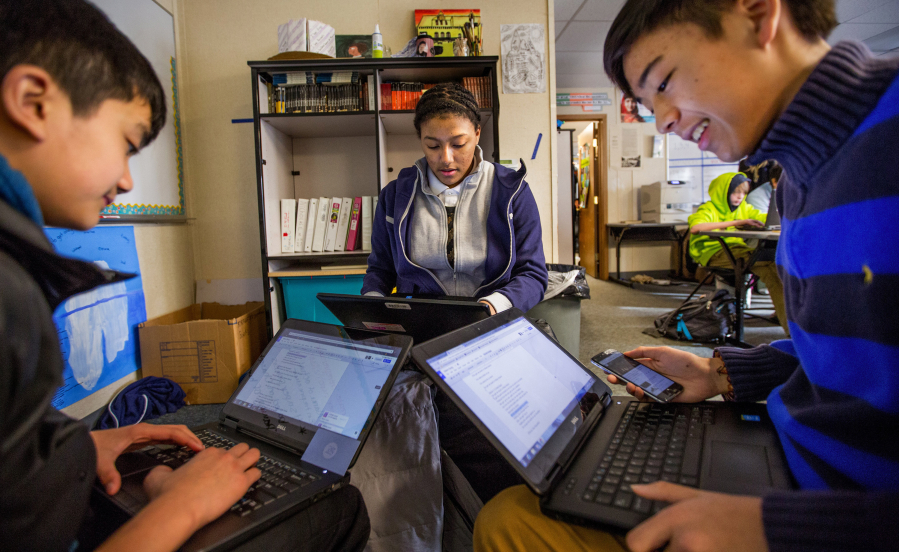FEDERAL WAY — The classrooms where Washington students get the kind of advanced-level learning that grooms them for advanced-level careers might make visitors wonder if they’ve somehow stepped back in time.
Black, Latino, American Indian and Pacific Islanders — who now comprise a third of all students — are nonetheless represented at minuscule rates in programs for the gifted, a statistic deemed “stunning” by the state official who manages them.
Whites and Asians, meanwhile, fill almost all those seats.
This long-standing trend places Washington in line with other states, and it is raising uncomfortable questions. Like the ones that swirled around Nila Griffin at age 12, as she listened to her mother speaking with a teacher during the first parent conference of sixth grade. Nila’s transcripts, from her previous school in California, were covered with 90th-percentile scores. Impressive, her new teacher said. But was Angela Griffin certain they were actually her daughter’s?
“I was shocked by that comment,” said Griffin, recalling the decade-old conversation at Illahee Middle School in Federal Way. “Nila had been in a Japanese-immersion program. She was pretty advanced in her learning and had the goal of becoming a doctor.”
The family tried not to leap to conclusions. But Angela Griffin, who is African-American, sensed similar skepticism later that year when Nila’s older sister tried to sign up for International Baccalaureate classes at her high school, also in Federal Way.
“The teacher looked at her on the first day and said ‘I think there’s been a mistake. I don’t think you’re supposed to be here,’ ” the girls’ mother said.
Griffin became so frustrated, and troubled, by similar stories from other minority parents that she ran — successfully — for the school board to push Federal Way toward re-examining its methods for finding academically talented kids.
“I saw this as a civil-rights issue,” she said.
Ten years later, things have changed dramatically.
The rate of black students doing advanced coursework has nearly doubled, to 34 percent, and Federal Way now has better participation among minority and low-income children in gifted programs than any other large, diverse district in the state.
Overall, however, Washington tolerates a persistent caste system in its schools, with an upper strata characterized by creativity and exploration, and a general-education track emphasizing little of that.
The label “gifted” is a loaded one. No proven marker of future brilliance, it is defined differently in different places, through an inconsistent mixture of I.Q. scores, state tests and teacher nominations. In some districts, students deemed gifted have their own schools; in others, their own classes.
What’s consistent is the racial uniformity.
Whites occupy 66 percent of the seats in Washington’s accelerated classrooms, and Asians much of the remainder. The big-picture ramifications — from future employment prospects to income inequality — keep education researchers awake at night.
“This is a huge public-policy issue nationally,” said Jonathan Plucker, a professor at Johns Hopkins University who has spent his career working with academically talented youth and is increasingly alarmed at the numbers.
“We all want to believe that in this country if you’re talented and work hard you’re going to be OK. But data show us that’s flat-out not true,” Plucker said.
Matter of privilege
Part of the problem lies in the way schools find talented kids — or don’t.
Data from the National Center for Research on Gifted Education at the University of Connecticut show that even when children in poverty test at the same levels as their peers, they are 250 percent less likely to be identified for gifted education.
Federal Way also used to have such divides. But starting in 2007, the district began to tackle the problem head-on. By 2015, all middle- and high-school students working at grade level were automatically enrolled in advanced courses, and every second-grader — about 1,800 children a year — was screened for high aptitude.
None of these changes came without struggle.
Parents accused the school board of watering down gifted-education as a sop to political correctness. Teachers stormed out of equity meetings, offended at the suggestion that they might be part of the reason for minimal rates of minorities doing advanced work.
And even now, after years of funneling more kids into Advanced Placement courses, only to watch two-thirds fail their end-of-year A.P. exams, the district’s new superintendent, Tammy Campbell, is doubling down on basics like third-grade reading.
“It’s not just a matter of putting more scholars in these courses,” she said. “It’s making sure they’re prepared when they get there.”
The question is one of definitions, and at the Robinson Center for Young Scholars at the University of Washington director Nancy Hertzog agrees that high I.Q. scores alone do not always correlate with giftedness — though that is a measure often used by schools. Hertzog sees these students as kids who need services akin to special education, rather than stars granted special status.
State officials, too, advocate a more nuanced evaluation that takes creative thinking into account. And they flat-out reject the kind of private intelligence testing that is popular as a gateway to gifted-and-talented programs in Seattle.
“When students are privately tested, they’re getting a completely different experience from the usual Saturday morning cattle call,” said Jody Hess, who supervises programs for the gifted at the state education department. “It’s just far more likely that a child is going to do better on that kind of test than they might in a group, and that’s a built-in advantage only available to families of means. It’s a privilege of wealth.”



